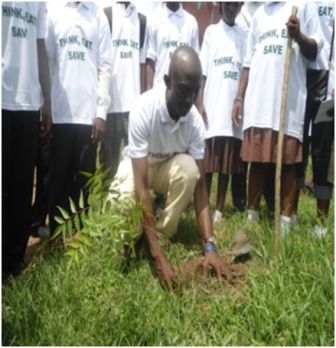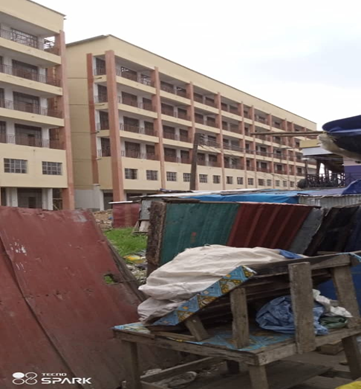Be Ecocitizens, Minister Tells Ivorians
GRAND-BASSAM, Cote d’Ivoire 14 June – Abidjan, fondly known here as the Pearl of the Lagoon, has lost some of its gleam to litter over the past 11 years. Parts of the city are almost “choking” in garbage, strewn by uncaring members of the public.
Little wonder, then, that on World Ocean Day 8 June Environment Minister Remi Allah-Kouadio appealed for residents to shed the littering habit and to become ecocitizens in this nation of some 22 million people.
Commemorating the Day in the historic beachside town of Grand-Bassam, a UNESCO World Heritage Site some 45 kilometres southeast of Abidjan, he told a modest audience: “If we don’t take into account the environmental dimension of our everyday existence we may be surprised by the anger of the environment.”
Managing used plastic is one of the city’s biggest environmental headaches Abidjan and smaller towns face. Some of this, and other waste, ends up on the beaches, in lagoons and in the ocean, scaring an otherwise enchanting landscape and harming tourism, beach hotels and artisanal fishing.
Officials chose the Grand-Bassam, a UNESCO World Heritage site, for this year’s World Ocean commemorations because it provided a fitting backdrop for the message and this year’s world theme: “Together we have the power to protect the ocean.” Grand-Bassam’s environmental problems are symptomatic of those that dog other coastal towns and locales such as San Pedro, Assinie and Grand Lahou. Grand-Bassam is also battered by coastal erosion, rising sea levels, invasive aquatic vegetation, and heavy yearly May and June rains, marine debris and town garbage.
A modest gathering of invited guests filled the neatly decorated white tables set under white canopy tents to hear to messages from the minister, the regional coordinator of the Abidjan Convention Secretariat, the representative of the mayor of Grand-Bassam, area traditional rulers and a panel of scientists and other environmental specialists. The chief of Azuretti Village in Grand-Bassam, Nana Boas, asked God to “help protect the ocean”. In support were the World’s reigning Miss Earth, Miss Earth South Africa 2012 and other officials of the Miss Earth Committee.
Earlier, the minister accompanied by town officials on an environmental sensitization tour of markets, restaurants, hotels in Grand-Bassam. The message he took to these establishment was “think, eat, save”, the theme of World Environment Day, celebrated 5 May, urging an end to wastage of food.
Protecting Cote d’Ivoire 209,000-square kilometer economic exclusion zone, which the minister said was equivalent to 65 per cent of the nation’s surface area, remains a concern. It is a highly overfished area and its coastline is under intense socioeconomic activity, lying along a heavy transport corridor linking Abidjan and Lagos, Nigeria’s commercial city of some 10million people some 830 kilometres to the northeast. The heavy human presence along the Ivorian coast is also a factor for environmental degradation of the coast and inshore waters. This comes from domestic, agricultural, industrial waste as well as from that of ships on the high seas. However, the area also holds a vast unexploited socioeconomic potential.
“Indeed, it is possible to make all other Ivorian cities and coastal locales poles of economic growth and social development for the entire nation,” Abou Bamba, the regional coordinator for the Abidjan Convention, told the audience.
But, he added, before embarking of massive development of the coastline in a bid to reduce poverty, unemployment and improve living conditions, it was important for the public to know that the ocean is not a “dumpsite for all sorts of waste and harmful substances.” He also promised the Convention Secretariat’s support to the government in building a society more respectful of the environment.
“We welcome the decision to ban the use of plastic bags and hope it would soon apply to non-recyclable plastic bottles that inundate our beaches and rivers,” Bamba said.
“We believe that the time of awareness raising has past and now we need to move onto the punishment phase for crimes and abuses against oceans,” he added.
Olubusiyi Sarr
Stay with Sierra Express Media, for your trusted place in news !
© 2013, https:. All rights reserved.






